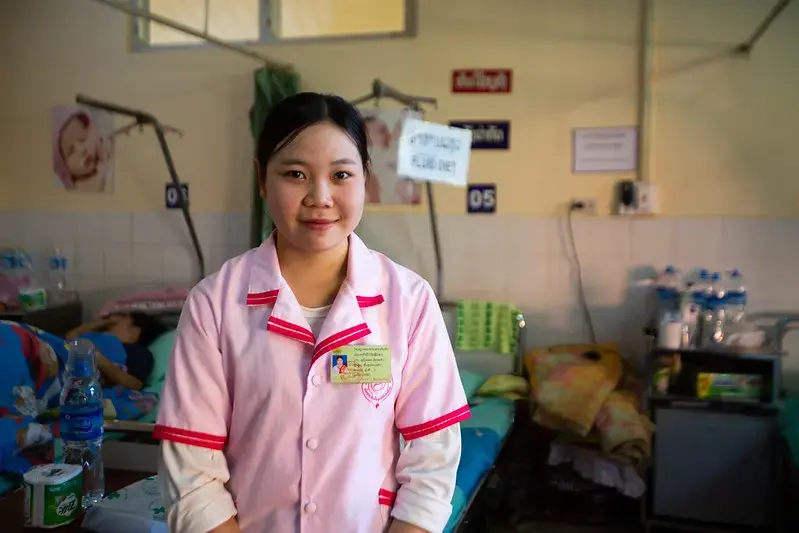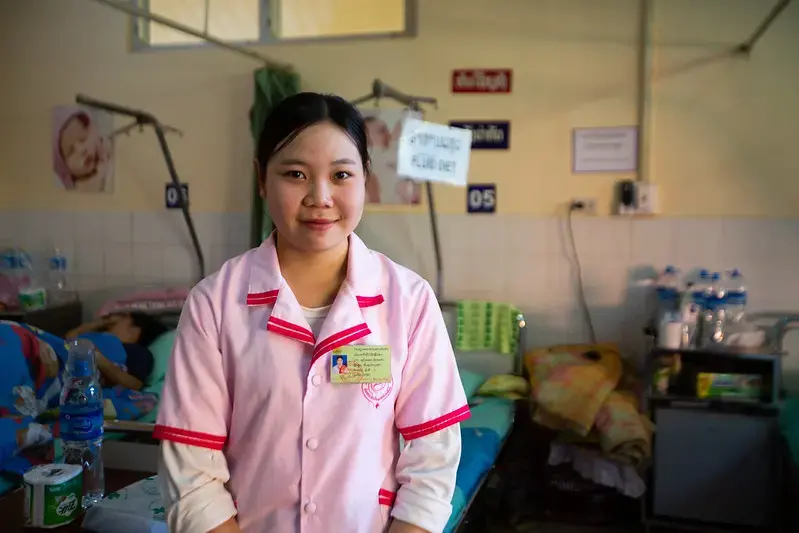Do you know who is Noi? Noi is an adolescent girl in Lao PDR who represents the 700,000 adolescent girls in in the country with their diversity, their potential and also their needs for education, health and protection from early marriage, teenage pregnancy, school drop out, gender based violence and child labor. COVID-19 has led to women and girls facing new burdens: additional unpaid work, higher chances of not returning to school, less access to health care, higher exposure to abuse, violence and sexual exploitation and lower incomes, all of which may reverse the hard won gains made so far.
Recognising that adolescent girls were further behind in accessing the right to education and health amongst other rights, the Noi approach was launched by the Government of Lao with UNFPA support to put adolescent girls at the forefront of the development agenda. Noi approach envisions that all adolescent girls in the country have the necessary life skills, opportunities to achieve their full potential by 2030. Comprehensive interventions were developed for Noi investments and progress is monitored through the Noi 2030 framework’s indicators. So why is it important to invest in educating and empowering girls?
- Girls who stay in school have better life choices and opportunities: The Nang Noi awareness sessions are being expanded to teach families and Village chiefs to encourage girls to go to school. According to the World Bank, a girl with an extra year of education can earn 20% more income as an adult. She is likely to avoid child labor, have choices and a healthier life with more income for her and her family’s well being.
- Empowered girls can avoid child marriage. Through activities led by the Non formal education Department of Ministry of Education, girls learn how to manage pressure and how to avoid child marriage. Girls focus on their development, studies, skills building. Empowerment includes providing them necessary sexual and reproductive health information and services. During COVID-19 lockdown, hygiene kits and nutritious food were provided through partner Crowne Plaza , so girls continue their routines, without hunger or shame.
- When girls (and boys) learn about family planning and sexual and reproductive rights, they can prevent adolescent pregnancy. They learn how the human body functions, about sexually transmitted infections and HIV prevention, about contraception and reproductive health and the importance of childbearing by choice not chance. In villages, UNFPA is engaging men and including boys in activities. Most recently, with Luxembourg Aid a mobile van is reaching youth in remote areas and in factories with essential services for youth.
- They are confident and know their rights. Educated girls and women have greater confidence and freedom to make decisions that affect their lives, to challenge cultural norms that hold women back.
- Girls know how to say No to discrimination and violence. Hotlines were extended to function extended hours during COVID-19 with Lao Women Union, Lao Youth Union and Vientiane Youth centers providing counselling and advice on matters related to sexual health and protection from violence.
- They can break the cycle of poverty: knowledge is power that girls will use to take care of their health and the health of their families and children. An informed girl will have better hygiene for herself and her children, understand the need for balanced nutrition to avoid anemia and ensure her children complete school. In partnership with Sinouk Cafe and Banque Franco Lao, UNFPA is delivering combined empowerment activities and financial literacy training.
- They are role models and advocates. Educated girls are more likely to access better opportunities and in turn be role models for other young girls. The first Nang Noi Girls Group had 200 participants, who noted the positive influence in their community. In a review, one of the mentors, a young girl from Kahan village, expressed herself through a song, with a lot of confidence, to share how Nang Noi program impacted her. She said: “I am proud to be a mentor for girls. Not just for myself but for my family and all my friends who learn from me. What I most loved about the group discussions is how to take care during menstruation, how to protect myself when I travel alone and the importance of nutrition”
Thanks to partners like the Government of Luxembourg, since the launch of the Nang Noi Girls Groups, over 600 girls and their families from Savannakhet and Bokeo provinces have benefited from awareness and life skills education. More than 9000 adolescents have engaged on ‘Me, My Body, My Planet, My Future” campaign for the goals of health and gender equality. The positive results have allowed UNFPA and partners to scale up and promote local ownership. Agreements were signed with Plan International to upscale Comprehensive Sexuality Education in 15 secondary schools in Oudomxay province and with ChildFund Laos for extending Comprehensive Sexuality Education in Secondary Education and Vocational Training in Xiengkhouang, Huaphan and Vientiane Provinces and raise awareness on Gender and youth friendly services.
These programmes are critical now, as incomes suffer and families make difficult choices. Protecting the rights of girls will determine Laos’ overall social economic progress in the long run. The Noi framework is part of the Government of Lao’s commitments to ICPD25, which in turn is a stepping stone to achieve the SDG targets for 2030.
For more information, please contact: laos.office@unfpa.org




